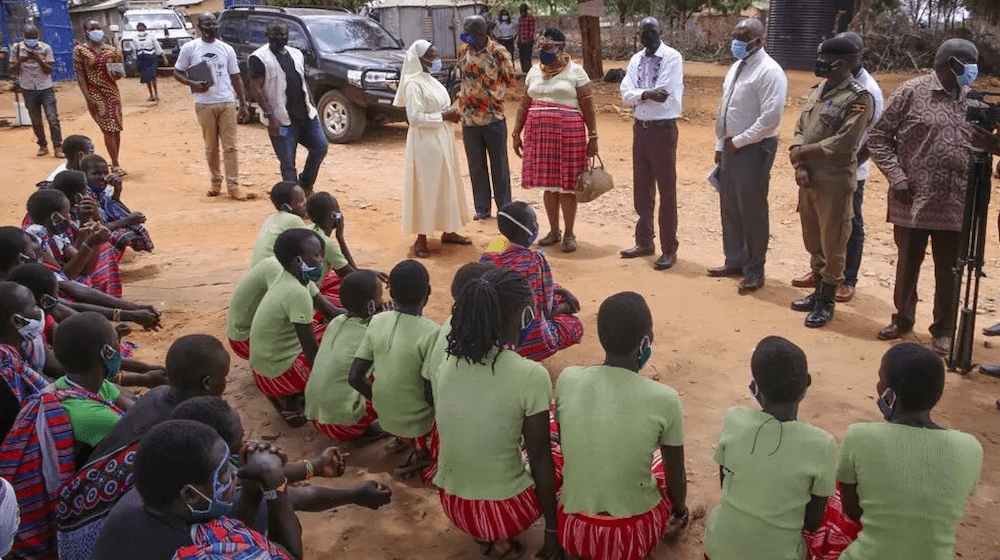KARAMOJA/SEBEI, Uganda – Fourteen-year-old Judith* and five other Pokot girls were lured across the border, into Kenya from Uganda, at the height of the COVID-19 pandemic. The reason - to undergo female genital mutilation (FGM). The perpetrator was a friend.
“One of our friends hatched a plan. She lied and tricked us. She told us we were going to visit her grandmother across the border in Kenya,” said Judith, from Kalas Girls Primary school in Amudat, a centre operating as a safe haven for girls fleeing or rescued from FGM or child marriage.
She lied and tricked us. Luckily, someone tipped us off and leaked information to us that we had been brought [there] to undergo FGM.
The two practices are deeply intertwined. Within the Pokot community, girls who have undergone FGM are deemed ready for marriage, and are removed from school.
In this case, the friend was acting at the behest of her mother. In fact, many of the girls’ families were also supportive of FGM. Estimates from 2020 found that in six districts of Uganda, where the practice is common, including Amudat, more than 26 per cent of women and girls aged 15 to 49 have been subjected to FGM – the national average, by contrast, is 0.3 per cent.
In June 2020, the five girls and their friend, who was also an adolescent, trekked barefoot for about 15 kilometres, from the Northeast Amudat District to Alale in Western Kenya, to visit the friend’s grandmother.
“We stayed there for over a week. One day, we were taken to a gold mining site to work in order to get money to pay the old woman. Luckily, someone tipped us off and leaked information to us that we had been brought [there] to undergo FGM,” Judith said.
Increased vulnerability
Both FGM and child marriage are illegal in Uganda and Kenya, yet the practices persist. FGM is perfomed underground because of deeply entrenched social norms.
“Three of us escaped and went to the local chief, who rescued us and took us to the assistant county commissioner. They rescued the other three girls. We were connected to the police in Amudat,” Judith said.
As at September 2021, the six girls, including the one who planned the trip due to the influence of her mother, were still living at Kalas Girls Primary School. Many feared returning home because of concern that they would be coerced into undergoing FGM and subsequently married off.
When we outlawed FGM, the practice didn’t stop. It went underground.
The COVID-19 pandemic increased the vulnerability of girls, delegates learned during a visit to the area late last year. The high-level visit brought ministers and members of the Parliamentary Committee on Gender, Labour and Social Development to the community to speak to locals about their experiences.
“We found out that there were increasing cases of [FGM], forced child marriage and teenage pregnancies during the COVID-19 pandemic,” said State Minister for Gender and Cultural Affairs, Hon. Peace Mutuuzo. “When we outlawed FGM, the practice didn’t stop. It went underground."
While FGM and child marriage – both forms of gender-based violence – existed within the community before the outbreak of COVID-19, the pandemic exacerbated the practices. Schools were closed and high levels of poverty in the remote region encouraged families to marry off their daughters.
Changing mindsets
UNFPA and UNICEF are working with community leaders to address these concerns through the Joint Programme to End Female Genital Mutilation and the Global Programme to End Child Marriage.
The Swedish International Development Agency, the EU Spotlight Initiative and the Global Programme on the Elimination of Female Genital Mutilation supported the high-level visit, which collected evidence for lawmakers and policy officials.
We need to do a lot of sensitization on mindset change and we are starting it now.
“A number of policy documents and legal frameworks will be reviewed to address existing gaps so that we can come up with a plan and programmes to tackle gender-based violence cases,” said Hon. Flavia Kabahenda Rwabuhoro, chairperson of the Parliamentary Committee on Gender, Labour and Social Development.
But laws alone will not address the issue, the ministers and delegates acknowledged. Budgets have to be allocated to solutions, education must be available for girls, and attitudes must change.
“We need to do a lot of sensitization on mindset change and we are starting it now,” Hon. Mutuuzo said.
*Name changed for privacy and protection



